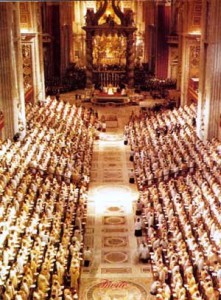 Dr. Peter Kwasniewski wrote to me the other day to alert me to his post at NLM about the Second Vatican Council and the Latin language. It is MUST READ reading. HERE
Dr. Peter Kwasniewski wrote to me the other day to alert me to his post at NLM about the Second Vatican Council and the Latin language. It is MUST READ reading. HERE
A taste to get you in…
The documents were compromises, no doubt about it; the liberals did plan to leave them behind as soon as possible, like lower stages of a Saturn V aiming for the moon; the traditional elements in the documents are, by now, almost completely buried and forgotten; the Church is plentifully reaping the destructive results of rupture and discontinuity. All this is true. But it still gives us no carte blanche for rewriting the Council itself, unless we wish to be among those whose mouths will be stopped.
Therefore, it is surprising, to say the least, to find a recent document making such claims as the following:
[…]
Guess which brand new Motu Proprio on translations he quoted next?
How curiously unlike what one discovers poring through the great big volumes that contain the speeches of the Council Fathers — all those religious superiors, bishops, archbishops, and cardinals who spoke day after day in the opening session in 1962!
When reading their speeches on the liturgy schema, one is struck by how often they return to the subject of Latin. Even after repeated requests by the moderators to stop talking about it, the subject kept popping up.
[…]
He then provides – no doubt at the cost of long labor of retyping – many summaries of interventions of Council Fathers provided by Henri de Lubac.
This is a real service to all of us.
Thank you, Peter.


































The liberals are always going on about Vatican II, but the authority that stands behind the Council derives from the bishops, cardinals and so on that attended it, does it not, and not from those who variously misinterpreted them post facto?
Although translation is not always betrayal, by definition the target language text is not the same text as the source. In this sense, we should read the quotation in the Notebooks “To attack the Latin language is in some way to impugn the immutability of dogmas.” As now we see…
O, prophetic cardinals, foretelling mass confusion (pardon the overworked pun) if Latin was abandoned wholesale for the vernacular.
This quote certainly resonates:
Card. Bacci. … The people will not understand any more in the vernacular than in Latin, because we are dealing here with mysterious things … Besides, it is enough that catechesis is in the vernacular. … Danger of disputes, of nationalism, especially in bilingual (Canada, Belgium) or trilingual (Switzerland) countries, to the great detriment of the Church. For the sacraments, one could permit some parts in the vernacular language, “probante tamen Sancta Sede” [with the Holy See’s approval, however]. Matters this serious should not be left to the bishops’ conferences. Otherwise, “magna diversitas et confusio” [great diversity and confusion], as already exists today.
Please please please go read the article!
Father,
What about Inter Oecumenici? Was this instruction also based on the will of the council fathers?
Card. Bacci’s comment resonates for me too: . … The people will not understand any more in the vernacular than in Latin, because we are dealing here with mysterious things
It reminds me of a late colleague who returned to the Church late in life. In the mid 60s, after many years of Catholic education, he spent a couple of tours in Vietnam as a Marine. He commented to me, “When I left, Mass was in Latin. When I came back to the States, the whole Mass was in English and I had no idea what they were talking about.”
A serious problem since the 15th and 16th Centuries is that people have been insisting on teaching to Catholics the pagan Classical Latin of 1st Century BC to 4th AD rather than the Late Latin of Jerome’s Bible nor the Late to Mediaeval/Gothic to Renaissance Latin of the Holy Mass nor the Church Latin of our Theology.
A powerful way to misread, misunderstand, and misinterpret the Latin Bible is via a poor presumption that Saint Jerome wrote in the language of 300-400 years previous, much like it might be to try and read this blog and its comments as if they were written in 17th-18th Century English …